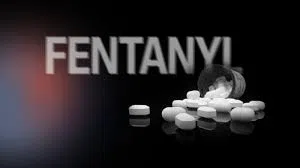Illinois Republican senators have filed bills that would combat the state’s fentanyl crisis and further punish major possessors of the drug.
One bill would reclassify a fentanyl overdose as a “poison,” while another would consider major fentanyl possessors a threat to public safety.
According to the Illinois Department of Public Health, Illinois experienced 3,261 fatal opioid-related drug overdoses in 2022, and 2,855 in 2023.“
There’s not one simple area that it affects. It’s everyone,” Sen. Sally Turner, R-Beason, said. “If you don’t know someone that’s been tainted with fentanyl, you will.”
Fentanyl is a synthetic opioid that can be up to 50 times stronger than heroin and 100 times stronger than morphine. The Center for Disease Control and Prevention (CDC) says fentanyl accounts for a major portion of all fatal and nonfatal overdoses in the U.S.
It’s usually added to other types of drugs to increase potency, making the laced- drug cheaper, more powerful, addictive and dangerous.
“A packet of sugar that you get at the restaurant, that’s about 2 milligrams,” Turner said. “If you compare that to 2 milligrams of fentanyl, that little packet could kill 500 people. So think about that. That’s how important this is.”
Turner and Sen. Sue Rezin, R-Morris, announced their sponsorship of the four fentanyl-related bills during a news conference with McLean County Coroner Kathleen Yoder in the Statehouse on Thursday.
Rezin championed Senate Bill 1283, which would change the official language of IDPH for a fentanyl-related death from an “overdose” to a “poisoning.”
Rep. La Shawn Ford, D-Chicago, said in an interview he is supportive of Rezin’s bill and is filing and sponsoring a duplicate bill in the House.
“It’s clear that fentanyl is poisonous, and people die from it,” he said. “And many times, people that die from the fentanyl overdose, they’re not intending to die, but they get a fatal dose, just like a fatal dose of any poison, and therefore it should be registered as a poison.”
Rezin is also pushing Senate Bill 113, which would require someone charged with handling 15 grams or more of substances containing fentanyl to prove that they do not pose a threat to public safety to be granted pretrial release.
Neither of Rezin’s bills have been assigned to a committee, however, Ford said he agreed with Rezin that such people are a threat to public safety and planned to talk with the senators further about the bill. His main concern is if judges can already do this under the Safe-T Act.
Naloxone – often referred to as its brand name, Narcan – is an over-the-counter medication as either a nasal spray or injection, and often is used to reverse opioid overdoses.
In 2010, Illinois passed the Good Samaritan Law, which allows non-medical personnel to administer Narcan to a person experiencing an opioid or heroin overdose. The law’s enactment led to the creation of the Drug Overdose and Prevention Program, which enabled the Illinois Department of Human Services to provide organizations with Narcan, for free, to be dispersed within communities in the state.
A CDC report from late 2024 disclosed that, like Illinois, fentanyl-related overdose deaths decreased from 2022 to 2023 – the first nation-wide decrease since 2018.
On Thursday, the Pritzker Administration released a statement that reported an 8.3% decrease in total drug overdose deaths in Illinois in 2023. Synthetic opioid-related deaths also dropped by 9.5%.
The statement noted that “several factors likely contributed to this decline, including sustained efforts to increase naloxone distribution throughout the state.”
Yoder, the McLean County coroner, reported that fentanyl has recently been mixed with new substances, like benzodiazepine and xylazine, often called tranq. These are substances that Narcan can’t reverse.

Comments